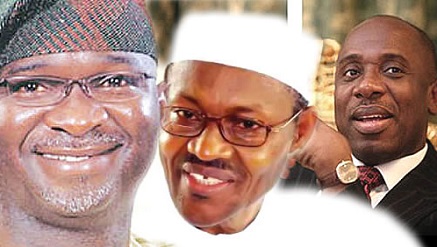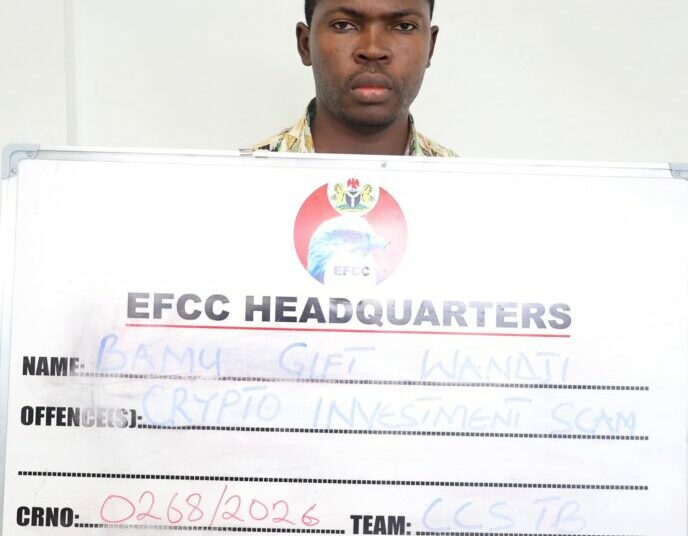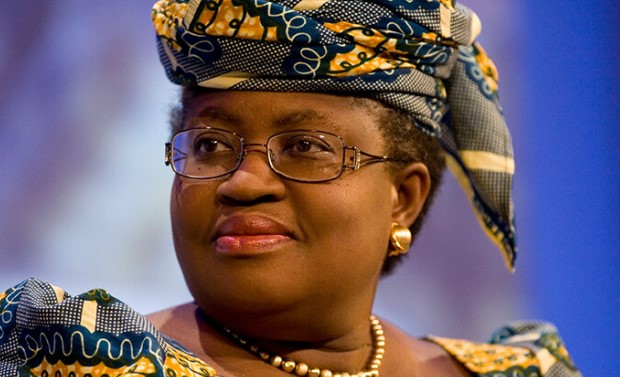News
DSS Accuses APC of Plot to Hack into INEC Database

Department of State Services (DSS) has said that its findings from the search of the Lagos office of the All Progressives Congress (APC) in November last year, alleging, among others, that the party planned to hack into the database of the Independent National Electoral Commission (INEC) to manipulate records.
Marilyn Ogar, DSS deputy director (Public Relations), said at a media briefing yesterday in Abuja, that after preliminary investigations, the DSS “suspects there was an elaborate and well articulated plan to inflate the party’s membership data as well as hack into INEC voter registration database.”
APC however dismissed the findings as hogwash, a great disservice to Nigeria and an embarrassment to all intelligence-gathering organisations around the world.
But Ogar said the raid on the APC’s office was carried out after a tip off that some cloning activities were going on in a building located at No. 10, Bola Ajibola Street, Ikeja, Lagos, without a signpost, banner or flag to indicate that it was a party office.
She said a permit was obtained for the operation during which the DSS officials found some items, which suggested that there was a well-hatched plan to hack into the electoral body’s database and corrupt it “and replace it with their own data.”
The DSS said that from its findings, the APC plans to scythe the system in a way that would enable them to manipulate even media reports in a predetermined direction. Ogar explained that a well articulated manual to perform all these tasks were served on the hard drive recovered from the office.
She listed the items recovered from the APC’s office as “a temporary voter’s card, a permanent voter’s card and some hard drives (one of the hard drives recovered from the building contained a video of twenty-one (21) hacking tutorials.)’’
According to the DSS, the tutorial video focused on how to become a hacker and steps to take to avoid detection in the process of hacking web servers, steps and procedures of system hacking, passwords cracking, decrypting, escalating access privileges, and creating backdoors to servers.
Ogar said the video “also explicitly explained how to evade security of databases such as Intrusion Detection Systems (IDS), firewalls and other measures put in place to deter hackers.
“The video outlined ways to identify vulnerabilities in systems and how to surreptitiously drop a USB flash drive in a target establishment, which when plugged into any computer, transmits malicious codes enough to gain access into and compromise the entire system of the target organisation. And how to hack into the systems of media houses, with the aim of broadcasting fake stories or headlines.”
While displaying pictures of underaged Nigerians allegedly registered as members of the APC, Ogar said registering underaged and infants as party members is contrary to the party’s constitution as contained in Article 9.1 which states that “membership of the party shall be open to any citizen of Nigeria who has attained the age of eighteen (18) years…”
The DSS alleged that: “Furthermore, the APC had multiple registrations of individuals in multiples of 16, 12, and 10.”
According to the DSS spokesperson, it was also discovered that some foreigners as well as security operatives were registered members of the party thereby putting a question mark on their understanding of the legitimate provision that all security personnel in the country must not be or be seen to be partisan.
“The APC registered several security personnel from the Nigerian Army (NA), the Nigeria Police Force (NPF), Nigeria Customs Service (NCS), Nigerian Security and Civil Defence Corps (NSCDC) and Federal Road Safety Corps (FRSC), among others, in their uniforms as members of the party. Several foreigners were also registered as its members,” the agency revealed.
The DSS expressed concern that the APC filled forms without passport photographs, and have books containing names of people with their phone numbers, as well as several envelopes containing passport photographs of various individuals.
While stating the position of the DSS that APC has plans to infiltrate the database of the electoral body “through the creation of party membership forms and cards to match INEC’s voters’ register across the country,” Ogar reiterated that the opinion expressed by some people “on the action of the service” cannot conceal the sacrosanct of truth.
It would be recalled that when the said residence was raided last year, some officials of APC were arrested and detained by the DSS. The party, through its spokesman, Lai Mohammed, came out with a statement demanding public apology from the service and immediate announcement of its findings.
He further accused the service of seeking to manufacture evidence to support its alleged faulty intelligence by delaying the announcement after a number of days.
Mohammed was quoted to have then said: “We are now asking them to immediately announce their findings to the world. After all, it took them only a few hours after their Gestapo-like invasion of our offices before they issued their baseless allegation of PVC cloning to justify their action.”
Ogar said those arrested have being released on bail, investigation is still continuing, as the DSS would take more evidences and the information acquired from some of the suspects to court for further litigation.
In a statement issued in Abuja yesterday by Mohammed, APC also alleged that the timing of the release of the ‘findings’ was a plot orchestrated in collusion with the Peoples Democratic Party (PDP) to distract the APC from its ongoing campaigns for next month’s elections.
It described as disingenuous, flimsy, premeditated, partisan and an irritant the conclusion that the APC had an ‘’articulated plan to inflate the party’s membership data as well as hack into INEC’s voters’ registration database through the creation of party membership forms and cards to match INEC’s voters’ register across the country.’’
The APC statement reads in part: ‘’First the DSS and the PDP said the APC was cloning Permanent Voters Cards at the raided office, without a shred of evidence. Now, after a ‘painstaking’ investigation, the DSS has found out that the APC was only planning to inflate its membership data and then hack into INEC’s database. And this is the outcome of its massive, months-long investigations?
‘’This would have been funny if it were not from a primary domestic intelligence agency saddled with a great responsibility. Can this wishy-washy report stand any serious scrutiny? Can any serious intelligence gathering agency anywhere else in the world take this report seriously? With these kind of findings, one can now understand why Boko Haram has continued to strike at times and places of its own choosing without any prior knowledge by our all-powerful DSS.
‘’We have always warned that our democracy is in clear and present danger, not just from desperate politicians, but also from institutions of state that have compromised in their roles and resorted to crass lawlessness. The DSS’ ‘findings’ today have given us another reason to repeat this.”
‘’While we are willing to meet the DSS in court, we can confidently say that the ‘confessions’ extracted from the arrested persons, after they were subjected to incredible acts of torture, cannot even stand in any court of law,’’ APC said.
News
NSCDC Hands over Fake Crypto Currency Trader to EFCC

Economic and Financial Crimes Commission (EFCC), at the weekend received Bamu Gift Wandji, a suspected operator of Polyfarm, a fake crypto-currency investment platform.

The suspect, Bamu Gift Wandji, was arrested by the Nigerian Security and Civil Defence Corps (NSCDC) in Gwagwalada Area Council of Abuja on January 12, 2026, for running a fraudulent investment scheme and was handed to the Commission for investigation.
Investigation by the EFCC revealed that the suspect created a fraudulent crypto investment platform called Polyfarm, where he allegedly lured innocent Nigerians to invest in Polygon, a crypto token that attracts high returns.
Investigation further revealed that he also deceived the public that his project, Polyfarm, has its native token called “polyfarm coin” which he sold to the public.
In his bid to promote the fraudulent scheme, the suspect had promoted the scheme on social media platforms, including WhatsApp, X (formally Twitter) and Telegram. He also conducted seminars in some major cities in Nigeria, including Kaduna, Lagos, Port harcourt and Abuja, where he described the scheme as a life-changing scheme.
Further investigation revealed that in October, 2025, subscribers who could not access their funds were informed by the suspect that the site was attacked by Lazarus group, a notorious cyber attacking group linked to North Korea.
Further investigations showed that the platform Polyfarm is not registered and not licensed with the Security and Exchange Commission (SEC) to carry out crypto transactions in Nigeria. Also, no investment happened with subscribers’ funds and that the suspect used funds paid by subscribers to pay others in the name of profit.
Investigation also revealed that native coin, polyfarm coin, was never listed on coin market cap and that the suspect sold worthless coins to the general public.
Contrary to the claim of the suspect that his platform was attacked, EFCC’s investigations revealed that the platform was never attacked or hacked by anyone and that the suspect withdrew investors funds and utilised the same for his personal gains.
The EFFC said the suspect will be charged to court upon conclusion of investigations.
News
Alakija’s Flourish Africa Provides N300m Grants for Women Entrepreneurs

Flourish Africa, a women-focused empowerment initiative founded by Apostle Folorunsho Alakija, has rolled out N300m in grants for women entrepreneurs across the country, following a rigorous national training and business pitch process.

Apostle Folorunsho Alakija,
The grant announcement was made at Flourish Africa’s ninth annual conference in Lagos, held under the theme ‘She Champions’, which brought together entrepreneurs, regulators, development partners, and private-sector leaders.
The grants were awarded under the fourth cycle of the Flourish Africa Grants Programme, during which 506 women entrepreneurs underwent intensive business training.
Out of this number, 409 participants submitted business plans, 200 advanced to the pitch stage, and 100 businesses were eventually selected to receive N3m each after evaluation by an independent panel of judges.
According to Alakija, founder of Flourish Africa, the structure of the programme was deliberately designed to emphasise merit, preparedness, and accountability among beneficiaries.
“We designed this process to be rigorous because Nigerian women entrepreneurs are capable of building serious businesses. Out of 506 women trained, only 100 emerged for funding. That discipline matters because access to capital must be matched with capacity, structure, and accountability if businesses are to survive and scale,” Alakija was quoted as saying, according to a statement on Sunday.
The organisation maintained that Nigeria has one of the highest rates of female entrepreneurship globally, yet many women-owned businesses continue to face challenges in accessing formal finance and growth opportunities.
Flourish Africa’s intervention, it was said, seeks to bridge this gap by combining skills development with practical exposure to investment and governance standards.
The selected businesses cut across sectors such as manufacturing, agribusiness, food processing, fashion, beauty, and services.
Judges involved in the process reportedly observed improved presentation quality, clearer business models, and stronger market articulation among participants compared to previous cohorts, while also highlighting the need for deeper financial literacy.
Beyond funding, the programme places strong emphasis on business governance, record-keeping, and scalability, with the aim of preparing participants for engagement with lenders, investors, and institutional markets.
“Women are already driving Nigeria’s informal and small-business economy. What Flourish Africa is doing is formalising that strength by equipping women with skills, governance, and funding. When women succeed in business, they reinvest in their families and communities, creating a multiplier effect that drives inclusive economic growth,” Alakija added.
As economic pressures continue to weigh on small businesses nationwide, initiatives aimed at strengthening sustainable women-led enterprises are expected to play a growing role in job creation and local economic development. Under the scheme, each beneficiary is expected to get N3m each
News
Okonjo-Iweala Urges Nigeria to Shift from Importing Tech to Local Manufacturing

Dr. Ngozi Okonjo-Iweala, Director-General of the World Trade Organisation, WTO, has urged Nigeria to move decisively beyond importing technology to manufacturing it locally, warning that sustained dependence on foreign technology weakens the country’s industrial base and constrains job creation in the digital economy.

Speaking at Ahmadu Bello University, ABU, Zaria, Okonjo-Iweala said the current disruption of the global order, driven by technology, geopolitics and climate pressures, presents both serious risks and unprecedented opportunities for Nigeria and Africa, if they are prepared to act strategically.
“It is always a pleasure to come home to Nigeria, but it is particularly special to be here at one of the country’s most important seats of learning,” she said, stressing that universities such as ABU must remain central to Africa’s technological, industrial and economic transformation.
Tracing Nigeria’s post-independence journey, Okonjo-Iweala recalled that at independence in 1960, the country had only one degree-awarding institution, making the rapid expansion of universities a critical pillar of nation-building.
She noted that institutions such as ABU laid the foundation for Nigeria’s scientific, technological and entrepreneurial capacity.
Founded in 1962 as the University of Northern Nigeria, ABU has evolved into a multidisciplinary institution producing graduates across engineering, medicine, sciences, ICT, public administration and the humanities.
“Research conducted here has advanced the frontier of knowledge and offered practical solutions to real-world problems, from animal feed innovations during dry seasons to wind power generation in rural areas,” she said.
Turning to global trends, the WTO chief identified technology, particularly the internet and artificial intelligence, AI, as one of the most disruptive forces reshaping trade, production and employment worldwide.
“The technological shift we are experiencing has made it easier to communicate, produce and trade, but not everyone has shared equally in the gains,” she said, warning that automation and AI could deepen inequality if not properly managed.
She stressed that multilateral institutions and global trade rules must evolve to respond to emerging technologies such as AI and quantum computing.
“We need a new kind of multilateralism, one that is nimble, responsive and capable of addressing new global opportunities,” she said.
Okonjo-Iweala said Africa stands to benefit from what the WTO now describes as “re-globalisation”, the diversification of global supply chains away from over-dependence on a few countries.
She identified opportunities in labour-intensive manufacturing, critical minerals processing, renewable energy technology, pharmaceuticals, agro-processing and electric vehicle, EV, supply chains.
“Africa has the capacity to process its critical minerals all the way to EV battery manufacturing,” she said, pointing to Nigeria’s emerging lithium processing investments and vast renewable energy potential.
Reinforcing her call for local technology production, she said Nigeria must stop importing technologies it can manufacture domestically.
“Instead of importing solar panels, we should be manufacturing them here. That is how we create jobs, build resilience and grow our economy,” she said.
Okonjo-Iweala warned that Nigeria’s projected economic growth of 4.4 percent remains insufficient once population growth is factored in, calling for sustained growth of 6 to 7 per cent driven by productivity, technology and value addition.
She said achieving this would require strong digital infrastructure, skills development and innovation-friendly policies, alongside full implementation of the African Continental Free Trade Agreement, AfCFTA.
“Technology-enabled trade and deeper regional integration could increase intra-African trade by up to 45 per cent and lift millions of people out of poverty,” she said.
With Africa projected to account for about 25 per cent of the global working-age population by 2050, Okonjo-Iweala described Nigeria’s young population as one of its greatest technology assets.
“On an ageing planet, Africa’s youth represent the world’s future talent pool,” she said, urging universities, policymakers and the private sector to better align education, innovation and industrial strategy.
She, therefore, called for stronger collaboration between academia, industry and government to ensure Nigeria does not miss the opportunities created by global technological disruption.
“This country has what it takes. What we need is urgency, coordination and the courage to invest in our people and our ideas,” Okonjo-Iweala said.

 General News2 days ago
General News2 days agoNigeria’s Data Privacy Economy Hits ₦16.2bn – NDPC Commissioner

 Telecom2 days ago
Telecom2 days agoAirtel Africa Records $586m Rise in Profit on FX Gains, Tariff Hike

 Telecom2 days ago
Telecom2 days agoAfrica’s AI Guru Abodunrin Charts Path to Continent’s Digital Dominance

 News2 days ago
News2 days agoOkonjo-Iweala Urges Nigeria to Shift from Importing Tech to Local Manufacturing

 E-Financial2 days ago
E-Financial2 days agoFitch Downgrades Afreximbank to ‘BB+’/Stable Amid Concerns Over Ghana’s Debt

 E-Financial2 days ago
E-Financial2 days agoEFCC Seeks Suspension, Prosecution of Banks for Aiding N162Bn Crypto Scams

 Telecom2 days ago
Telecom2 days agoNCC Unveils Q4 2025 Network Performance Report, Pledges Transparency and Accountability

 Telecom10 hours ago
Telecom10 hours agoTelecom Operators Invest Over $1Bn on 2,850 New Sites in 2025 – NCC

























